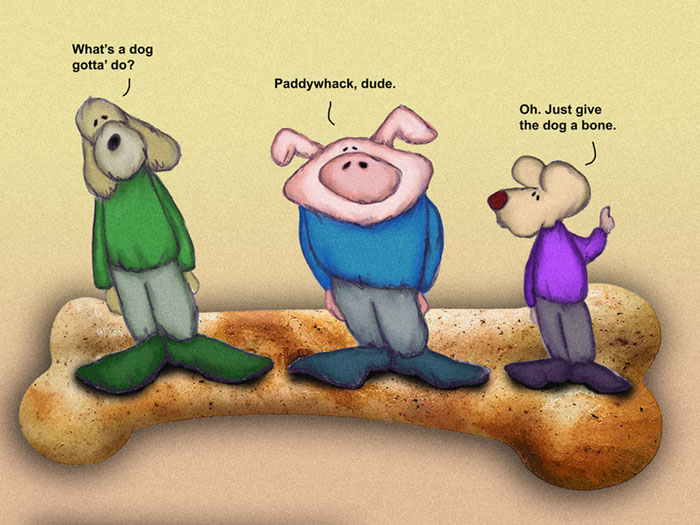Every once in a while, out of the clear blue, out it comes.
I can’t help it really. It just starts. And before I know it, I’m standing in the middle of the kitchen with a wooden spoon in my hand, belting out the lyrics for the “Knick Knack Paddy Whack” song.
I always start with the chorus.
“With a knick-knack paddy whack, Give the dog a bone.”
For years, I have been singing the lyrics wrong.
From what I found online, the right way is.
This old man he played one
He played knick-knack on my drum
With a knick-knack paddy whack
Give a dog a bone
This old man came rolling home
Two. Shoe.
Three. Tree.
Four. Door.
Five. Hive.
Six. Stick.
Seven. Deven.
Eight. Gate.
Nine. Vine.
Ten. Hen.
At one, I start out wrong, with the old man playing knick-knack on my thumb.
It gets worse from there. By number three, it is on my knee.
And what the heck is a “deven?”
Really. What in the wide world does the whole thing mean? At face value, many of these children’s songs seem like a bunch of gibberish. Rhymy, slimy, dimey, timey. Almost like they were deliberately trying to dummy us down. One, two, buckle my shoe.
But in this case, the whole knickknack paddywhack thing might have some meaning behind it.
This traditional rhyme was first published in 1906. But historians say it almost certainly originates from earlier, dating back to the time of the Irish potato famine.
They say the biggest clue to the meaning focuses on “paddywhack” and then, to a lesser extent, “knick-knack.”
It follows along like this. A Paddy is a term still used by the English to refer to the Irish. And, of course, “whack” means to hit something hard and forcefully. We all know that a knick-knack is a trinket or some other trivial item like those Hummel figurines or little glass poodles.
Anyway, the song turns back to Irish history. There was a great deal of resentment by the Irish people towards the English. This is because the English conquered Ireland and began to settle their country in the sixteenth century. Those English blokes took the nice things. They owned much of the best land, and the Irish became the working tenants.
It continues. Ireland was known for its potatoes. That was the staple food there. However, in 1845 the potato crops failed horribly. As a result, a huge famine led to more than 25% of the Irish population dying. Or leaving.
Mostly, the English landowners did nothing to help their tenants and often turned them out of their houses. Of course, this really hacked off the Irish more than anything. In fact, they were so mad, they formed the Irish Republican Army to drive the English out.
Now. Here is where the song comes in. Many Irish men moved out of the country to places where there was food and jobs. Like England. And the USA. As such, a lot of Irish men became tinkers selling pots, pans, cutlery, and other knick-knacks door to door in England.
Most of them were told to get lost, hit the road, and on. Rejection, time after time. They may have been given a whack as they were sent on their way. To make matters worse, those English people that let the Irish starve would happily give a bone to any old dog.
Finally, those Irish tinkers would go from place to place in a caravan. Carts on wheels that were pulled by a horse. Hence, “rolling home.”
So, yes. This happy children’s song is now a sad, sad story. I can no longer sing this without crying, eating potatoes, and telling my dog he can’t have a bone right now, in solidarity with the Irish.
Erin go buy a bra. Crap. Did I get those lyrics wrong too?
=========
“The better I get to know men, the more I find myself loving dogs.”
– Charles de Gaulle
=========
“Because they are mean is no reason why I should be. (Amy March)”
― Louisa May Alcott, Little Women
==========
“Nowadays what isn’t worth saying is sung.”
― Pierre-Augustin Caron de Beaumarchais, Le Barbier de Séville
============
Paddywhack you. On my knee.
